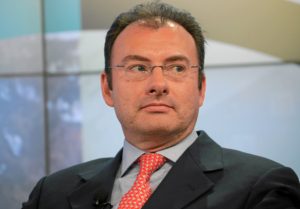Mexican Minister of Finance resigns after Trump visit
Luis Videgaray, Mexico’s Minister of Finance since 2012 and one of President Enrique Peña Nieto’s closest advisers, announced his resignation on September 7, a week after Republican candidate Donald Trump’s controversial visit to the United States’ southern neighbor. Despite complaints from government officials on both ends of the political spectrum, Videgaray insisted that a meeting between Peña Nieto and Trump would help the fragile relationship between Mexico and the presidential nominee, who has adopted criticism of Mexicans as a cornerstone of his campaign.
Unsurprisingly, Trump’s visit to the country was extremely unpopular among Mexicans. As multiple protests dominated the streets of Mexico City, opinion polls indicated that 85 percent thought the trip was a mistake. In the political arena, several ministers, including the Minister of Foreign Relations Claudia Ruiz Massieu, threatened to resign after the trip was announced in an effort to voice their dissatisfaction.
The controversy surrounding the visit translates into Peña Nieto’s latest popularity rating, which, at 23 percent, is the worst of any Mexican president on record.
Although Peña Nieto did not give specific reasons as to why Videgaray resigned, many political analysts suggest that his resignation is the president’s attempt to ‘‘help mitigate the anger,’’ as José Antonio Crespo, a professor of politics at Centro de Investigación y Docencia Económicas, told The New York Times.
Videgaray’s legacy in the Ministry of Finance includes two important financial and budgetary reforms that facilitated access to credit and reduced the Mexican economy’s dependency on oil exports.
Peña Nieto appointed José Antonio Meade, the former six-year Social Development Minister, to replace Videgaray. Now, Meade faces the challenge of containing Mexico’s mounting debt

, currently almost 45 percent of its GDP, to prevent it from affecting the public sector.
